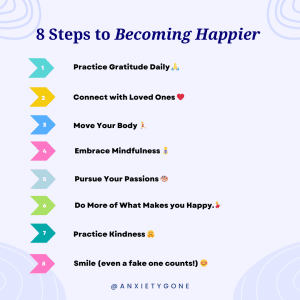Full Disclosure: Clicking on these links could mean a tiny commission for me, at no extra cost to you.
Everyone wants to be happy. It’s a universal goal that transcends cultures and backgrounds. Happiness means feeling good, content, and fulfilled, often with lots of positive emotions. However, finding and keeping happiness can be tough. Life is filled with all kinds of ups and downs, and sometimes, it can feel like you’re stuck in the lulls for far longer than expected. The good news: this article has all the scoop and practical steps to help you be happy and become a happier person as a whole. Whether you’re struggling with depression, seasonal affective disorder or simply want to increase your happiness, consider this your guide to learning how to be happy again.
How to Be Happy
To be happy, it’s essential to understand the foundational principles of happiness. These include cultivating positive emotions, engaging in activities that bring joy, nurturing relationships, finding purpose, and practicing self-care. By focusing on these areas, you can create a solid foundation for a happier life.
Happy Hormones
The body produces certain chemicals known as happy hormones, which play a crucial role in regulating mood and emotional well-being. These include dopamine, serotonin, oxytocin, and endorphins. Understanding how these hormones work and how to stimulate their production can help you manage your happiness levels.
How to Be Happy Again After Trauma or Heartbreak
Life can be challenging, and setbacks are inevitable. However, it’s possible to find happiness again after difficult times. Focus on self-compassion and allow yourself to heal. Engage in activities that bring you joy and reconnect with supportive friends and family.
How to Be Happy with Yourself
Self-acceptance is key to lasting happiness. Embrace your strengths and weaknesses, and practice self-compassion. Remember that no one is perfect, and it’s okay to make mistakes. Treat yourself with kindness and prioritize your well-being.
How to Be Happy When Depressed
Depression can make finding happiness seem impossible. However, with the right strategies, it’s possible to manage depression and work towards happiness. Seek professional help if needed, and incorporate activities that improve your mood, such as exercise, therapy, and social interactions.
How to Feel Better Quickly
Sometimes, you need a quick mood boost. Simple techniques like deep breathing, taking a walk, or listening to your favorite music can help you feel better instantly. Incorporate these quick fixes into your routine to maintain a positive mindset.
How to Be a Happier Person: 11 Simple Steps to Happiness
Incremental changes can significantly impact your overall happiness. Start by identifying areas of your life that need improvement and set realistic goals Celebrate small victories and gradually build a happier life. In no time, you will become a happier person.
1. Manage Your Stress
If stress is a constant in your life, you need some stress relief strategies to manage it better. While you can’t avoid all stress, you can certainly change how you respond to it.
Take a proactive approach to tackle stressors directly. This might mean having a tough conversation with a loved one who isn’t respecting your boundaries or putting extra effort into your self-care routine. Although it might be challenging at first, addressing stress early is crucial for managing it.
There are many additional effective stress management techniques you can add to your daily routine to help your body respond better to stress. Time management is a great one, especially if your stress comes from feeling rushed or overwhelmed by tasks and deadlines.
Calming breathing techniques are also incredibly helpful. Experiment with stress-relieving breathing exercises to find one that calms you during high-stress moments. You can also explore powerful breathwork classes online.
Breathe for Relief
Inward Breathwork offers guided breathwork sessions designed to reduce stress and enhance your well-being. Try it now with a 14-day free trial and feel the difference breathwork can make.
Free Trial
2. Release Your Stress and Anxiety in a Journal
Learning how to be happy can be as easy as pulling out a journal and using it to dump all of your stress and anxiety onto the pages. Keeping a journal can be a wonderful stress management tool for sorting through your thoughts, understanding your emotions, and making plans for the future. The beauty of it is that you don’t need to be a wordsmith or fill pages to experience its benefits.
Try jotting down a few thoughts before bedtime or use a guided mental health journal that prompts you to explore different thoughts. If the idea of putting your thoughts on paper feels daunting, remember that you can always shred it once you’re done – it’s the process of letting it out that truly matters.
Feeling unsure about how to navigate the emotions that surface in your journal? Our anxiety journal, The Ultimate Anxiety Relief Journal, guides you through 100 self-therapy questions to help you find inner peace. It’s also available on Amazon.
3. Improve Your Social Media Habits
Social media can be a double-edged sword. While it helps us connect with others who share similar experiences, it can also feel overwhelming. Taking a mindful approach to your social media habits can significantly boost your happiness and mental health. Consider setting specific times for social media use. This simple change can free up mental space, reduce stress, and encourage a healthier relationship with technology.
Creating a positive online environment by following accounts that inspire and uplift you, rather than trigger negativity, can also significantly impact your mood.
Remember, the goal isn’t to eliminate social media entirely but to reshape your relationship with it.
4. Reduce Alcohol Consumption
During challenging times, the allure of alcohol as a means to numb pain can be strong, but it’s essential to recognize that alcohol use might intensify emotions, making you feel angrier or more aggressive, and even exacerbate feelings of depression. Discovering tips on moderating alcohol consumption can be a positive step in supporting your emotional health.
We recommend trying the #1 Best Selling Alcohol Reduction Guide to help you reduce the amount of alcohol you drink.
5. Invest in 3 Healthy Habits: Diet, Exercise & Sleep
Eating a well-balanced, anti-anxiety diet is essential for reducing anxiety and depression and learning how to be a happier person. The food you put into your body directly impacts the way you feel and function. By ensuring you’re getting all the delicious and nutritious foods in your diet, you’ll be supporting your mental health while also allowing your brain and body to function efficiently.
Engaging in regular exercise is another excellent way to boost your happiness, as it releases chemicals in your brain that increase your mood. Beyond the immediate mood boost, exercise also contributes to better sleep, increased energy levels, anxiety relief and a healthier heart.
Find an activity you enjoy, whether it’s a online yoga classes or a walk with a friend, and aim for at least 150 minutes a week to reap the full benefits. Get 50% off your online yoga membership here.
Getting deep, restful sleep is another key habit for happiness. Prioritize rest by investing in healthy bedtime habits, such as journaling to help organize your thoughts and clear your mind of distractions.
6. Set Healthy Boundaries
Establishing clear and healthy boundaries is a powerful act of self-care that can significantly contribute to your overall happiness. Whether in personal relationships, work, or daily life, knowing and communicating your limits is a crucial step to learning how to be happy.
One of the main benefits of setting boundaries is the preservation of your mental health and emotional wellbeing. It prevents burnout, reduces stress, and ensures that you allocate time and energy to activities that genuinely matter to you. By clearly defining what you’re comfortable with and communicating those limits to others, you create a space where your needs and priorities are acknowledged and respected. It allows you to prioritize your own wellbeing without guilt, giving you the freedom to say “no” when necessary.
7. Do More Of What Makes You Happy
Engaging in activities you genuinely enjoy is a wonderful way to nurture your mental health and emotional wellbeing. It’s the little things, like catching a sports game with a friend, indulging in a relaxing bath, or sharing a coffee date with friends, that can truly brighten your day. Doing something you excel at, whether it’s cooking up a storm or dancing to your favorite tunes, not only brings joy but also provides a satisfying sense of accomplishment.
While seeking enjoyment, it’s important to be mindful of activities that may offer short-term pleasure but leave you feeling worse afterwards, like excessive alcohol consumption or indulging in junk food. Prioritize activities that bring both immediate joy and lasting positive effects on your well-being, creating a supportive and uplifting environment for yourself.
8. Do Random Acts of Kindness
Have you ever held the door open for a stranger or gave someone a compliment and felt terrible about it? Of course not. Studies indicate that engaging in acts of kindness can significantly improve your mental health and wellbeing.
A simple and effective way to spread positivity is by offering sincere compliments, instantly brightening someone’s day while simultaneously enhancing your own happiness. You might be pleasantly surprised by the positive impact it has on your own mood.
9. Talk Therapy
Therapy provides a safe and non-judgmental space to express and process emotions. Unpacking and discussing challenges with a trained professional can bring relief, reduce emotional burden, and pave the way for increased emotional resilience.
Through therapy, you can gain deeper insights into your thoughts, emotions, and behaviors, allowing you to gain a greater understanding of yourself and your life circumstances.
Therapy will also set you up with valuable coping mechanisms and tools to navigate life’s complexities. Whether it’s managing stress, improving communication skills, or addressing patterns of behavior, therapy ensures you have practical strategies for positive change.
10. Smile More
Learning how to be happy can be as simple as smiling more. Smiling is a powerful and accessible tool for increasing happiness and overall mental health and wellbeing. Beyond being a universal expression of joy, the act of smiling triggers a cascade of positive effects within the body and mind. When you smile, your brain releases endorphins, the feel-good neurotransmitters, which not only elevate your mood but also act as natural stress relievers.
Smiling is also contagious. When you share a smile with others, it creates a ripple effect, enhancing not only your mood but also contributing to a more joyful and connected world.
Additionally, the physical act of smiling can have a bidirectional impact on emotions. While a genuine smile reflects inner happiness, the act of intentionally smiling, even when you may not initially feel like it, can signal to your brain to release those mood-boosting endorphins, creating a positive feedback loop.
Nonetheless, the simple act of smiling is a natural and accessible strategy for increasing happiness.
Tap Into Anxiety Relief Right Now
→ Mindfulness Meditation: Gain access to over 2000 guided meditations, stress relief techniques, and personalized plans to help you stay calm and focused. Get Started
→ Breathwork : Receive guided breathwork sessions designed to reduce stress and enhance your well-being. Get Started
11. Breathe Deeply
When we use deep, intentional breaths, it triggers a physiological response that can positively impact both the body and mind. One of the key benefits is stress reduction. Deep breathing activates the body’s relaxation response, signaling the nervous system to shift from a state of fight-or-flight to one of calm and balance. It also regulates emotions and promotes a sense of calm, making it particularly helpful in managing anxiety and reducing feelings of tension or overwhelm.
So, incorporating deep breathing into your daily routine is a valuable and accessible habit, helping you learn how to be happy and build emotional resilience in the face of life’s challenges.
Get a free month of breathwork classes here.
12. Build Resilience
Building resilience is like creating a mental health toolkit for navigating life’s ups and downs with an unwavering sense of strength and adaptability. It’s not about avoiding challenges but rather, about bouncing back from setbacks, gaining wisdom from experiences, and emerging even stronger in the face of adversity.
At the heart of resilience lies the power of a positive mindset. Nurturing an optimistic outlook helps you view challenges as opportunities for personal growth, as opposed to permanent roadblocks. This mental fortitude allows you to confront difficulties with a hopeful spirit and an unyielding determination.
Healthy coping methods, such as mindfulness, exercise, and constructive problem-solving are essential tools for managing stress and rebounding from challenges with increased emotional strength.
13. Overcoming Negative Emotions
Negative emotions are a natural part of life, but it’s important to manage them effectively. Develop coping mechanisms such as deep breathing, journaling, or talking to a trusted friend. By addressing negative emotions head-on, you can prevent them from overshadowing your happiness.
14. Finding Purpose and Meaning
Having a sense of purpose can significantly enhance your happiness. Set goals that align with your values and passions. Engage in activities that give your life meaning, whether it’s through work, hobbies, or volunteering.
15. Building Positive Relationships
Strong social connections are essential for happiness. Invest time and effort in building and maintaining relationships with people who support and uplift you. Surround yourself with positive influences and be a source of positivity for others.
16. Invest in a Happy Environment
Your environment plays a significant role in your happiness. Create a living space that is clean, organized, and filled with things that bring you joy.
Additionally, spend more time in nature to benefit from its calming and rejuvenating effects.
17. Maintain Work-Life Balance
Balancing professional and personal life is crucial for happiness. Set workplace boundaries to ensure you have time for both work and leisure. Prioritize activities that bring you joy and make time for relaxation.
18. Manage Your Finances
Financial stability can greatly influence your happiness. Manage your finances wisely by budgeting, saving, and avoiding unnecessary debt. Ensuring you have financial well-being will reduce stress and allows you to focus on what truly matters.
How to Feel Happy: Final Thoughts on How to Become a Happier Person
Understanding what makes you happy is crucial. Reflect on past experiences and identify activities or situations that brought you joy. Practice gratitude by acknowledging and appreciating the positive aspects of your life. By focusing on what makes you happy, you can cultivate a more joyful mindset.
If you’re still struggling with finding happiness, speaking with a trained professional may be the best option for you. Online counselling is an amazing place to start the healing process – and it’s a fraction of the cost of in-person sessions.
FAQs on How to Be Happy
How can I be happy?
Understanding the basic principles of happiness and incorporating daily habits that promote well-being can help you find joy.
How to feel happy?
Identify self care activities that bring you joy and practice gratitude to cultivate a happier mindset.
How to be happier?
Make incremental changes in your life, set realistic goals, and celebrate small victories.
What are happy hormones?
Happy hormones like dopamine, serotonin, oxytocin, and endorphins play a crucial role in regulating mood and emotional well-being.
How to be happy when depressed?
Seek professional help, incorporate mood-boosting activities, and build a support network to manage depression and work towards happiness.
How to Be Happy Infographics











